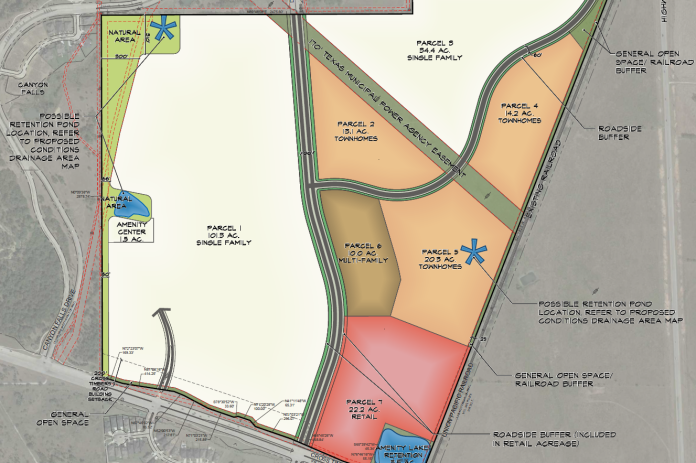On Monday night, the Flower Mound Town Council approved a residential development that will bring over 1,400 homes — including hundreds of apartments and townhomes — to the northwest corner of FM 1171 and Hwy 377.
In 2021, the town received an application for a huge warehouse park, with 10 buildings totaling over 3.27 million-square-feet, for the property. Hundreds of residents in the adjacent Canyon Falls subdivision voiced their vehement opposition to the proposed warehouse park, and in April 2022, the Town Council approved new zoning for the property and eliminated warehouses as a possible use for the land. The proposed developer, Crow Holdings, then withdrew from the project.
The next month, the property owner filed a federal lawsuit against the town over the denied warehouse park, according to town documents. In July 2023, during mediation, the property owner proposed a 263-acre residential development as an alternative, with Green Brick Partners as the proposed developer, referred to as La Estancia. A month later, the property owner and town entered an abatement agreement to explore the settlement and proposed development. Those details have been under negotiation between both parties since then.
According to a town staff presentation during Monday’s council meeting, the initial proposed concept plan called for 2,302 apartments, 400 townhomes and 556 houses, as well as some commercial use on the 264-acre tract of land. The town negotiated the number of apartments down and the amount of commercial space up, resulting in 300 apartments, 477 townhomes and 713 houses in high-density zoning, a 54% reduction in overall density from the original plan. A formal application was submitted in December.
As part of the negotiation, the town agreed to purchase a 22-acre retail tract on the northwest corner of FM 1171/Hwy 377 “to secure retail opportunities … and to buy down some of the multi-family units” according to staff. The land is being acquired “at a fair price” of $7.5 million. Approval of all of the council agenda items related to the property, and the closing of the land purchase, will result in the lawsuit being settled and dismissed.
Council member Ann Martin called the proposed development “a good project” and a “good fit for the area.”
“I think the adjacency, residential to residential, is appropriate,” Martin said. “I’m also happy that we have the opportunity to carve out some retail space, because we’ve been hearing for a long time that residents in this area of town need and want some amenities, in particular a grocery store, very close by.”
Council member Adam Schiestel said he was “just as frustrated as anyone that so much of this process had to take place in closed session.”
“We like to be transparent, but it’s just a simple fact that there was pending litigation and later a real estate transaction,” Schiestel said.
Schiestel then asked town staff and the town attorney several questions to publicly establish that the town never violated the Open Meetings Act, that the town never disregarded attorneys’ advice, that council never took actions not in accordance with the law, that the town paid a fair price for the land and that it will be able to sell it.
Schiestel later said that he would normally not support such a high-density development, “but there’s nothing normal about this property or the process that we got here,” adding that he believes this plan will meet requests from neighboring residents who opposed the warehouses and wanted something that fit better with the surrounding area and would bring some amenities there.
Town Council voted to approve the requested Master Plan amendment, zoning change and the Capital Improvement Agreement, which outlines the process for the reimbursement of CIP projects from impact fees and TIRZ revenues.





















